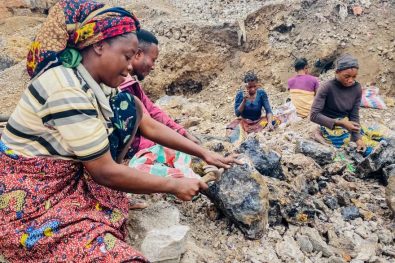Miners working at the Mutoshi concession in the Democratic Republic of Congo (December 2022). Courtesy of Dorothée Baumann-Pauly
Blockchain technology will now be used to track cobalt mined in the Democratic Republic of Congo as it makes its way into smartphones and electric cars. Cobalt is used in lithium-ion batteries, but the cobalt mining industry has had a long-standing problem of using child labor, subjecting children to working in dangerous mines.
The pilot project to be launched this year aims to eventually give manufacturers assurance that the cobalt they source was not mined with child labor.
Reuters reports that blockchain is not new to the mining industry:
The plan for the Congo pilot scheme is to give each sealed bag of cobalt produced by a vetted artisanal miner a digital tag which is entered on blockchain using a mobile phone, along with details of the weight, date, time and perhaps a photo.
At the next stage, a trader buying the bag would record the details on blockchain, and the process would be repeated until the ore gets to the smelter – leaving an immutable record of the cobalt’s journey for downstream buyers or third parties to view.
The pilot will involve organisations throughout the supply chain, from on-the-ground monitors checking that sites are not using child labour, through the refining process to end users, according to people helping to develop the scheme.
One potential risk in the supply chain is that cobalt mined by children gets mixed with “clean” cobalt before processing.
Businesses in China, the main destination for Congolese cobalt, realize that companies are under increasing pressure to show consumers that their supply chains are free from human rights abuses. Accordingly, they have formed the Responsible Cobalt Initiative — joined by Apple and Samsung — to address child labor.
Other observers, including Sheila Warren, head of blockchain policy at the World Economic Forum, said the prevalence of conflict, lawlessness, and an opaque legal system in the DRC were outstanding challenges to blockchain succeeding. “The technology is not the hard part,” she said.
Amnesty International, which documented the extent of child labor in the DRC’s cobalt industry in 2016 says technology like blockchain is not a silver bullet to solving this problem. “You have to be wary of technological solutions to problems that are also political and economic, but blockchain may help. We’re not against it,” commented Amnesty researcher Mark Dummett.







Freedom United is interested in hearing from our community and welcomes relevant, informed comments, advice, and insights that advance the conversation around our campaigns and advocacy. We value inclusivity and respect within our community. To be approved, your comments should be civil.